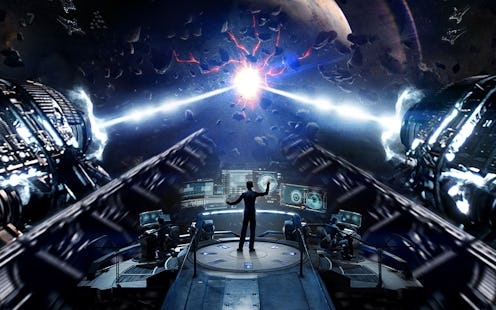
Growing up as a bookish and nerdy kid, I read a lot of science fiction and fantasy — consumed it, more like. But among all the books I've read, there's a title that stands out from the rest as the one sci-fi novel every Slytherin should read. It was a book that grabbed my little Slytherin heart and never let go. I'm talking, of course, about Ender's Game by Orson Scott Card.
Spoiler Warning: The following contains spoilers for both the Orson Scott Card novel, Ender's Game, and the 2013 film of the same name.
Winner of the Nebula and Hugo Awards, Ender's Game tells the story of a small, intellectual boy growing up on a near-future Earth that is threatened by an insectoid alien race, the "Buggers." As part of its ongoing fight against the aliens, Earth has established elite training facilities for children who show military promise, with the ultimate goal of one day launching an all-out assault to eradicate the Buggers.
For Slytherins, Ender's Game is unputdownable. Card's tale of a contemplative boy forced to be decisive in exacting circumstances will ring true for anyone whose logical decision making has produced effective, if extreme, results. Regardless of whether or not you like science fiction, if you're a Slytherin who hasn't read Ender's Game, you absolutely should. Here's why.
1. Ender Is a Uniquely Talented, Pure-Blood Child
Andrew "Ender" Wiggin is a Third: a rare child in a society that traditionally allots only two children to each couple. He's the result of a breeding program designed to bring about the military leader Earth needs to defeat the Buggers. Ender's siblings were previous candidates for heroship, but Peter was too violent, and Valentine was too passive. That leaves little Ender — the one who will end it all.
Part of a house known for prioritizing purebloods, Slytherins will appreciate Ender's unique beginnings and "chosen one" status.
2. Ender's Siblings Manipulate Global Politics
While Ender is at school, his older siblings stay begin an Earthside war of words. Posting anonymously to the novel's version of the Internet, the two older Wiggins spread each other's philosophy to hew their rhetorical talents. Aggressive Peter posts as the temperate Locke, while mild Valentine writes as the extremist Demosthenes.
Countries all over Earth are preparing for what will happen after the aliens are destroyed or the planet is invaded, and Peter aspires to become a respected politician during the upcoming reconstruction period. Valentine plays along only because she hopes to rein in Peter's thirst for power. She can't, and she and Ender eventually flee Peter and their home planet, never to return.
Although Peter and Valentine take measures to ensure their anonymity, both their parents and the military work out their true identities with relative ease. Of course, no one can let the children know that their secret's been compromised, and so the children continue to believe they've outsmarted the adults.
As noted in the points below, it's this kind of clandestine information-gathering that makes Ender's Game such an important sci-fi novel for Slytherins.
3. 'Ender's Game' Is All About Information-Gathering
At Ender's school, each student has a personal "desk" on which they can draw, write, read, play games, send messages, browse networks, and access academic lessons. Although desks have manual keyboards, they are quite similar to a modern-day tablet.
Before they reach school age, the military outfits every child with a monitoring device that records their vital signs, as well as what they see and hear. These monitors are worn during the child's formative period, and the collected data determines who will receive further military training.
Ravenclaw might be the house with an interest in science, but Slytherins love data. We collect information on people around us to use to our later advantage. If we had the surveillance and communication options in Ender's Game, we could gather more data more quickly to produce better results.
4. The Military Wants a Strong Leader — At Any Cost
The military makes sure Ender is prepared to do whatever it takes to defeat the Buggers. From the moment he arrives at school, Ender's superiors isolate him, and stoke others' resentment toward him by commenting on Ender's exceptional qualities.
Students are separated into Armies, sort of like Hogwarts houses, but with more violence. The adults manipulate Ender's place within these houses to test him. He's quickly promoted to Salamander Army, where he makes only one friend before the commander trades him to Rat Army. Ender soon receives another promotion to become the commander of Dragon Army, which consists of very-green, very-young students, and isn't allowed to trade with other Armies.
Ender comes to hate the adults who have put him in this situation, and resolves to rebel however he can. This isn't a huge personality shift for Ender, who has always done exactly what was necessary — and no more — to get the results he desired. He isn't cruel, but he hurts children who attempt to bully him, because that's the only way to stop them, according to his analysis. Although he feels deep shame for these occasional moments of brutality, Ender's willingness to take necessary measures proves to the adults that he's the military leader Earth has been waiting for.
Even though Ender is the child soldier they have wanted all along, the military cannot reveal the realities of his schooling to him. They lie to him for years, and the little hero only learns the truth about major events in his life after the novel's climax.
Ender and his superiors are engaged in a near-constant battle of wills, each willing to do what it takes to meet their goals. With Hogwarts' most-vilified house being the abode of "those cunning folk [who] use any means to achieve their ends," Ender's Game's intrigue and cruelty will speak to any Slytherin.